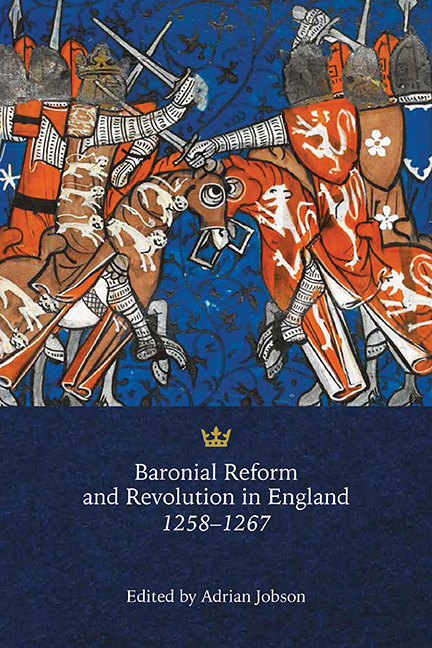Book contents
- Frontmatter
- Dedication
- Contents
- List of Illustrations
- Acknowledgements
- List of Abbreviations
- Introduction
- Modern Historians and the Period of Reform and Rebellion, 1258–1265
- The Secret Revolution of 1258
- Baronial Reform, the Justiciar’s Court and Commercial Legislation: The Case of Grimsby
- Crisis Management: Baronial Reform at the Exchequer
- Local Administration during the Period of Reform and Rebellion
- What Happened in 1261?
- Writing Reform and Rebellion
- Civic Government in Troubled Times: London c.1263–1270
- The Montfortian Bishops
- Reformers and Royalists: Aristocratic Women in Politics, 1258–1267
- The Midlands Knights and the Barons’ War: The Warwickshire Evidence
- Retinues, Agents and Garrisons during the Barons’ Wars
- The Barons’ War in the North of England, 1264–1265
- The Maritime Theatre, 1258–1267
- Reasserting Medieval Kingship: King Henry III and the Dictum of Kenilworth
- Index
Introduction
Published online by Cambridge University Press: 21 May 2021
- Frontmatter
- Dedication
- Contents
- List of Illustrations
- Acknowledgements
- List of Abbreviations
- Introduction
- Modern Historians and the Period of Reform and Rebellion, 1258–1265
- The Secret Revolution of 1258
- Baronial Reform, the Justiciar’s Court and Commercial Legislation: The Case of Grimsby
- Crisis Management: Baronial Reform at the Exchequer
- Local Administration during the Period of Reform and Rebellion
- What Happened in 1261?
- Writing Reform and Rebellion
- Civic Government in Troubled Times: London c.1263–1270
- The Montfortian Bishops
- Reformers and Royalists: Aristocratic Women in Politics, 1258–1267
- The Midlands Knights and the Barons’ War: The Warwickshire Evidence
- Retinues, Agents and Garrisons during the Barons’ Wars
- The Barons’ War in the North of England, 1264–1265
- The Maritime Theatre, 1258–1267
- Reasserting Medieval Kingship: King Henry III and the Dictum of Kenilworth
- Index
Summary
On 30 April 1258, seven leading English magnates confronted King Henry III in Westminster Hall to demand that the ‘state of the realm’ be reformed. This dramatic moment marked the beginning of a protracted political struggle, lasting almost a decade, between Henry and his baronial opponents, the leadership of which was soon assumed by Simon de Montfort, the king's charismatic brotherin- law and earl of Leicester. The central point of contention was who, ultimately, should control the government of the realm. Henry accepted the principle that he was subject to the law, but ministerial appointments, he consistently maintained, were a fundamental royal prerogative. For the king's opponents, however, his selection of unsuitable officials, lack of consultation, heavy financial exactions and partiality for his alien relatives necessitated political reform.
Just weeks after Henry's enforced submission at Westminster, the baronial reformers secured effective control over royal government at both a national and local level. Fully exploiting their newly achieved political ascendancy, they soon embarked upon an ambitious programme of legislative and administrative reform that was subsequently codified in two major enactments: the Provisions of Oxford (June 1258) and the Provisions of Westminster (October 1259). Authority was now invested in an elected council, which would exercise power on the king's behalf. Sheriffs would be elected locally on an annual basis, while allegations of official malpractice were to be investigated by the newly appointed justiciar. Henry, however, resented the restrictions placed upon his prerogative and secretly worked for their overthrow. In 1261 success attended his efforts: Henry recovered his political independence, and the unity of the baronial leadership was subverted. But a discontented minority, headed by Montfort, refused to accept the reversal in their political fortunes. Two more years of political manoeuvrings followed as the balance of power regularly shifted between each side. June 1263 witnessed a closely orchestrated revolt, originating in the Welsh Marches but quickly spreading across the country, that soon overwhelmed the complacent royalist government. Henry, politically isolated, had little choice but to confirm the reformist ordinances and legislation promulgated in 1258–59. Baronial rule may have been restored, but the myriad challenges facing Montfort's nascent regime ensured that it proved to be of only temporary duration.
- Type
- Chapter
- Information
- Baronial Reform and Revolution in England, 1258-1267 , pp. 1 - 12Publisher: Boydell & BrewerPrint publication year: 2016



